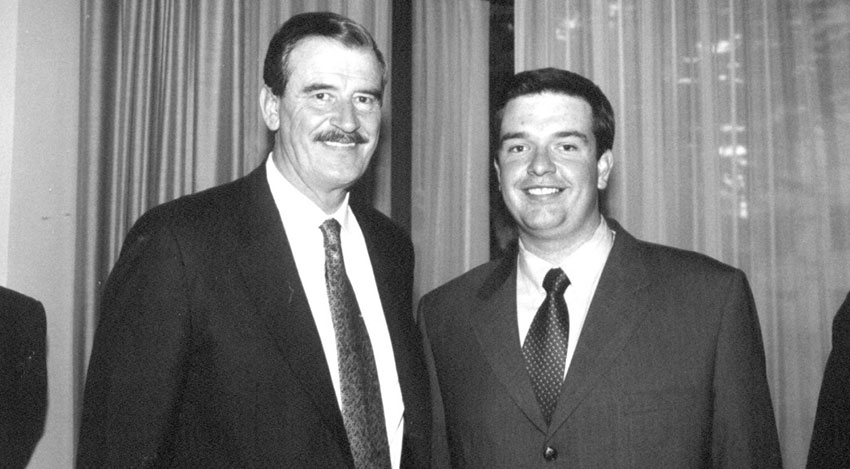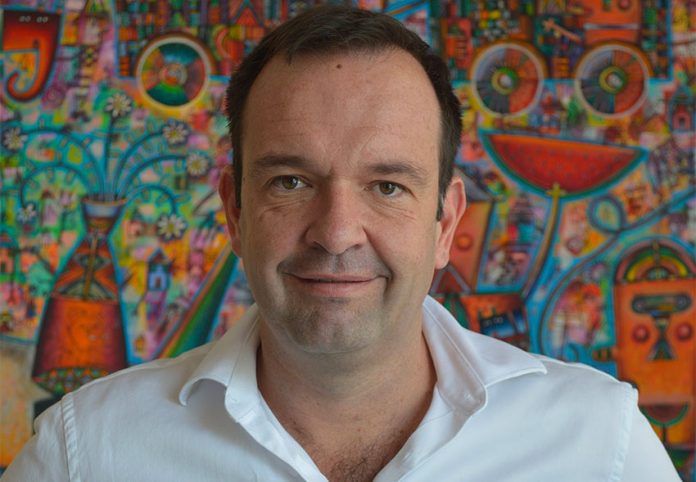After creating various businesses since his youth, Javier de Lope Francés stated that he wanted to retire at age 40. That deadline has just passed, and there is no indication that he is slowing down.
Unlike many traditional Mexican businessmen, De Lope is casual in his dress, speech, and body language. He also eschews many of the political connections that grease the wheels of business. But it is refreshing to meet someone who prefers to let his work speak for him.
His is not entirely a rags-to-riches story. Born in Puebla a first-generation Mexican, his parents had immigrated to Mexico from Spain and carved for themselves a solidly middle-class life – he a manager at a plastics plant and she a professor at the Universidad de las Americas in Puebla.
De Lope’s talent for entrepreneurship appeared early. At age 7, he began selling recyclables. His first “business” was buying the prizes from junk food bags that college students did not want and selling them to his elementary school classmates.
His first major score was when he was in California to do a year of high school. One of his teachers saw De Lope’s Hard Rock México pin and wanted it. Soon De Lope had an internet page selling Mexican Hard Rock memorabilia to buyers from the United States, Europe, and Japan. He invested the $25,000 earnings into a car inspection station when he returned to Puebla. A year later, he sold it to attend college.

De Lope earned his degree in industrial engineering at the Tec de Monterrey in 2002, founding two businesses in the meantime. The first made handcrafted picture frames. Within a year, he had a plan to expand it. He entered the plan into the Venture Challenge 2000 at San Diego University, coming in third. This prompted corporations such as Ticketmaster and Price Costco to pledge US $1 million to the venture. It grew to making 20,000 frames a week, exporting to 10 countries.
The second was creating printed agendas with advertising to distribute free to university students, first in Puebla, then in other major cities. The idea came to him while bored in class, having forgotten his notebook. The buzz he generated with his businesses led to an offer to write a book, Para Los Negocios No Hay Edad (In business there is no age), which was published by his alma mater and whose preface was written by former president Vicente Fox.
Perhaps sentimentally, De Lope held onto both companies for about 20 years before finally selling the picture frame enterprise and closing the notebook one.
Many entrepreneurs become famous because they found a company and become the face of that enterprise — Bill Gates and Microsoft, for example. But since college, De Lope’s public profile has been low key. The main reason is that his energy has been poured into the creation of companies in various fields, then selling them when they hit their stride.
Around the time De Lope graduated, Puebla began experiencing a building boom especially in the upscale south and west. He began building upscale shopping centers such as the Sonata center in Cholula, but found more opportunity in the construction of private hospitals, leading to Torres Médicas in the south of the city, as well as in Veracruz.
Adapting technology to the Mexican context is another focus of his. The first business of this type was El Súper Negocio, a service for ordering groceries and medicines online for delivery. When the Mexican government decided to shift to digital registration of receipts for tax purposes, he created several businesses for this purpose. One of his most recent projects is Código 46, a DNA testing facility similar to 23andMe. Technology and real estate provide the opportunity for co-working spaces. They work in Mexico, De Lope says, for many of the same reasons they work in other places in the world.

De Lope is not a publisher, architect, programmer, or chemist, so I asked him how he could work in all these fields without specialized knowledge. The answer is that Mexico has a wealth of capable professionals that can do this work, often for less than those in the United States and Europe. This allows him to focus on creating the service.
De Lope says the lessons he learned with his first tiny businesses as a child still apply — the value of money representing time and effort, the need to invest, and the need to be focused while taking risks. He strongly believes in Mexico’s potential for entrepreneurship.
“You can see it everywhere in Mexico, from the person selling on the street.” He believes what holds people back is Mexico’s poor education system and a wholly broken system of laws and banking. Nothing short of an overhaul is needed in both for the country and people to reach their potential.
De Lope focuses on these ideas in talks to university students because even in bad times, such as the Covid crisis, there are opportunities. He believes that Mexico’s business culture will change significantly, taking better advantage of digital technologies because of the economic advantages of doing meetings and conferences online. This will hurt business travel but reward those who shift into services for home offices and the like.
De Lope says his motivation is finding and catching the next wave. It is unlikely he will stop finding such waves, and besides, there is still a sequel to his book to write.
Leigh Thelmadatter arrived in Mexico 17 years ago and fell in love with the land and the culture. She publishes a blog called Creative Hands of Mexico and her first book, Mexican Cartonería: Paper, Paste and Fiesta, was published last year. Her culture blog appears weekly on Mexico News Daily.
